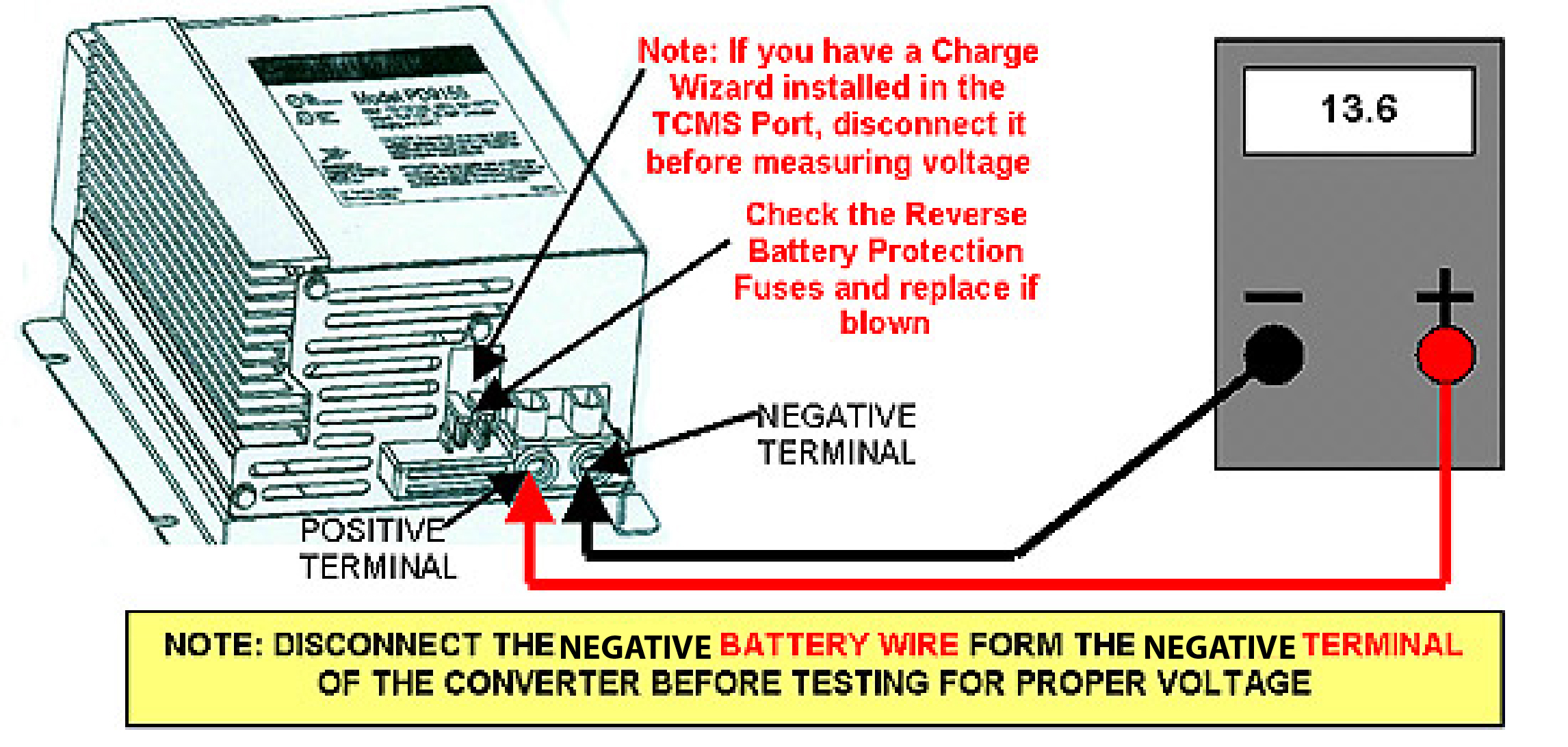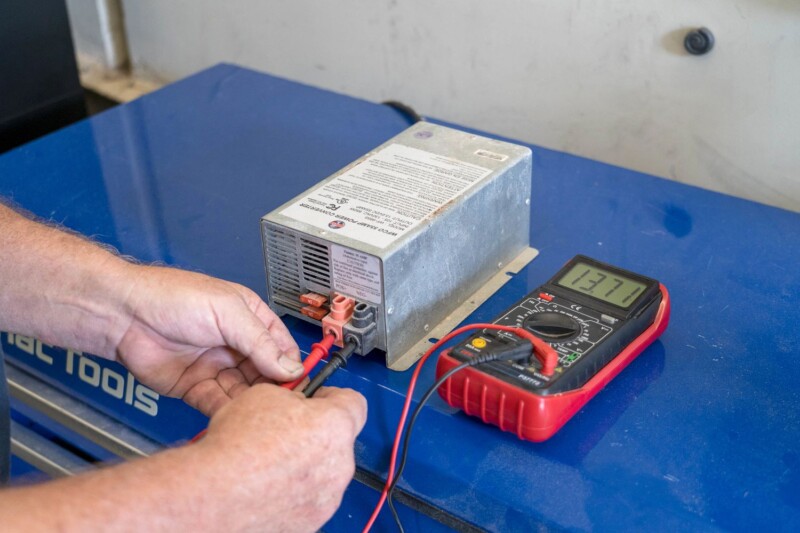To tell if a power converter in a camper is bad, check for flickering lights or dead batteries. Also, test the output voltage with a multimeter.
Maintaining a functional power converter in your camper is crucial for a reliable power supply. A faulty converter can lead to various electrical issues, affecting your lights, appliances, and battery charging capabilities. Identifying a bad power converter early can save you from inconvenient breakdowns during your trips.
Common signs of a failing converter include inconsistent power output, strange noises, or overheating. Regular inspections and timely replacements ensure your camper’s electrical system remains efficient. Understanding the symptoms of a bad power converter helps in timely troubleshooting and maintaining a smooth camping experience.
Signs Of A Bad Power Converter
Flickering lights can mean a bad power converter. Lights might dim or brighten on their own. This happens often when other devices are used. It is a clear sign of trouble.
Strange sounds may come from the converter. Buzzing or humming noises are common. These sounds can be loud or soft. A bad converter often makes these noises.

Credit: m.youtube.com
Testing Voltage Levels
First, set the multimeter to measure DC voltage. Make sure the camper is connected to shore power. Place the red probe on the positive terminal. Place the black probe on the negative terminal. Check the display reading. A healthy power converter should show between 13.6 to 14.4 volts.
Reading under 13 volts means the power converter might be bad. Reading above 15 volts indicates a possible issue. Both cases need further inspection. Consistent low or high readings require professional help. Proper voltage ensures the camper’s electrical system works well.
Inspecting Fuses And Breakers
Check the fuse box for any blown fuses. Fuses protect the electrical system. A blown fuse may indicate a problem. Replace the blown fuse with a new one. Use the same amp rating. If the new fuse blows quickly, there is a deeper issue. This could be a sign of a bad power converter. Always keep spare fuses in your camper. They are essential for on-the-road fixes.
Inspect the breakers in the camper. A tripped breaker needs resetting. Flip it to the off position first. Then, flip it back to the on position. If it trips again, there might be a fault. This could point to a bad power converter. Ensure all connections are secure. Loose connections can cause problems. Always use the right tools for safety. A multimeter can help check voltage. It ensures accurate readings.
Checking Battery Condition
Check the battery for any leaks or cracks. Look at the terminals. They should be clean and free of corrosion. A swollen battery is a bad sign. It may mean the power converter is not working right. Make sure all connections are tight.
Use a multimeter to check the battery voltage. Set the multimeter to DC volts. Place the red probe on the positive terminal. Place the black probe on the negative terminal. A good battery should show between 12.6 and 12.8 volts. If the reading is lower, the power converter might be bad.
Monitoring Electrical Appliances
Appliances might stop working if the power converter is bad. Lights may flicker or not turn on at all. Microwaves and fridges may not function correctly. Fans and heaters could run slower or not at all. Check if your battery is fully charged but appliances still malfunction. This could point to a bad power converter.
Power fluctuations can be a sign of a bad converter. Lights may dim and brighten unexpectedly. Devices may turn off and on without warning. Voltage levels can be inconsistent. Use a voltmeter to check for stable voltage. If voltage jumps a lot, the power converter might be bad.
Examining Converter Connections
Loose wires can cause many problems. Make sure all wires are tightly connected. Wiggle each wire gently. If a wire moves, it might be loose. Tighten any loose connections using a screwdriver. Loose wires can lead to poor power flow. This can make your converter work poorly.
Corrosion can damage your converter. Look for green or white build-up on wires. This is a sign of corrosion. Clean the affected area with a wire brush. Apply a corrosion inhibitor afterward. Corrosion can block electric flow. This will affect the converter’s performance. Keeping connections clean ensures a good power supply.
Understanding Converter Lifespan
A power converter in a camper usually lasts 5 to 10 years. Frequent use may shorten its life. Proper maintenance can extend its lifespan. Regular checks are important.
Several factors affect a converter’s life. Temperature can be a big factor. High heat may damage it. Moisture can also cause problems. Dust and dirt can clog parts. Overloading the system can lead to failure. Poor quality converters don’t last long.

Credit: www.progressivedyn.com
When To Seek Professional Help
Power converters can be tricky. Sometimes, the issues are not obvious. Special tools might be needed. Expert knowledge can make a big difference. Complex electronics require careful handling. Experts know what to look for. They can spot hidden problems.
Electricity is dangerous. Working with power converters can be risky. Professional help ensures safety. Experts follow safety protocols. They prevent accidents and injuries. Qualified technicians have proper training. They know how to handle electrical issues safely.

Credit: blog.campingworld.com
Frequently Asked Questions
How Can I Tell If My Camper Power Converter Is Bad?
Check for dimming lights or malfunctioning appliances. Listen for unusual noises. Measure the output voltage. If it’s inconsistent, the converter might be bad.
What Are The Symptoms Of A Bad Power Converter?
Symptoms include flickering lights, dead batteries, or non-functional appliances. Strange noises or smells can also indicate a failing power converter.
Why Is My Camper Battery Not Charging?
A bad power converter might be the cause. Test the converter’s output. If it’s low or unstable, it needs replacement.
How Do I Test My Camper Power Converter?
Use a multimeter to measure the output voltage. Compare it with the recommended range. Inconsistencies indicate a bad power converter.
Conclusion
Detecting a bad power converter in your camper is crucial for a smooth trip. Regular checks and understanding the signs can help you avoid issues. Always consult a professional if unsure. Your peace of mind on the road depends on a well-functioning power system.
Happy camping and safe travels!

